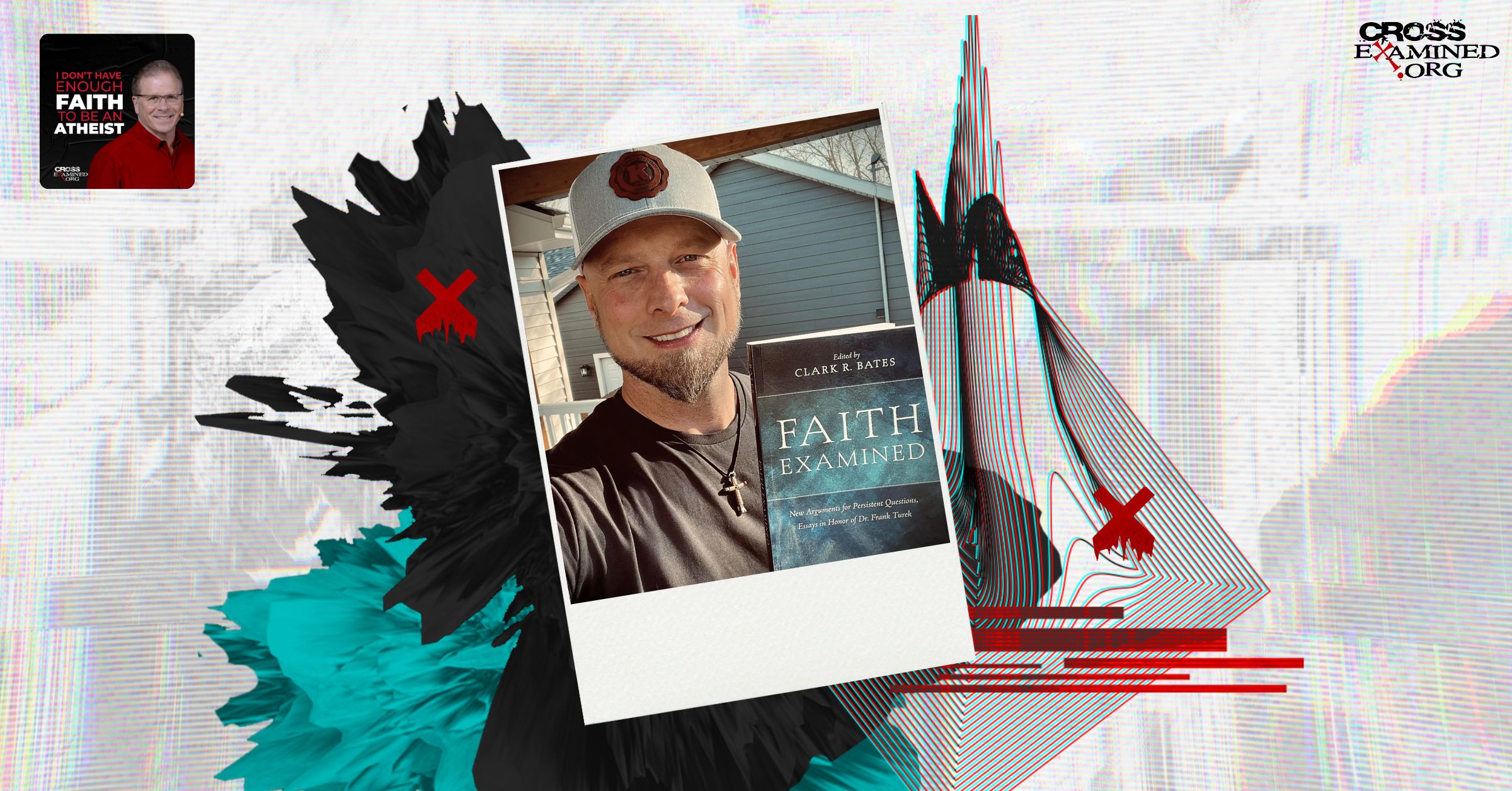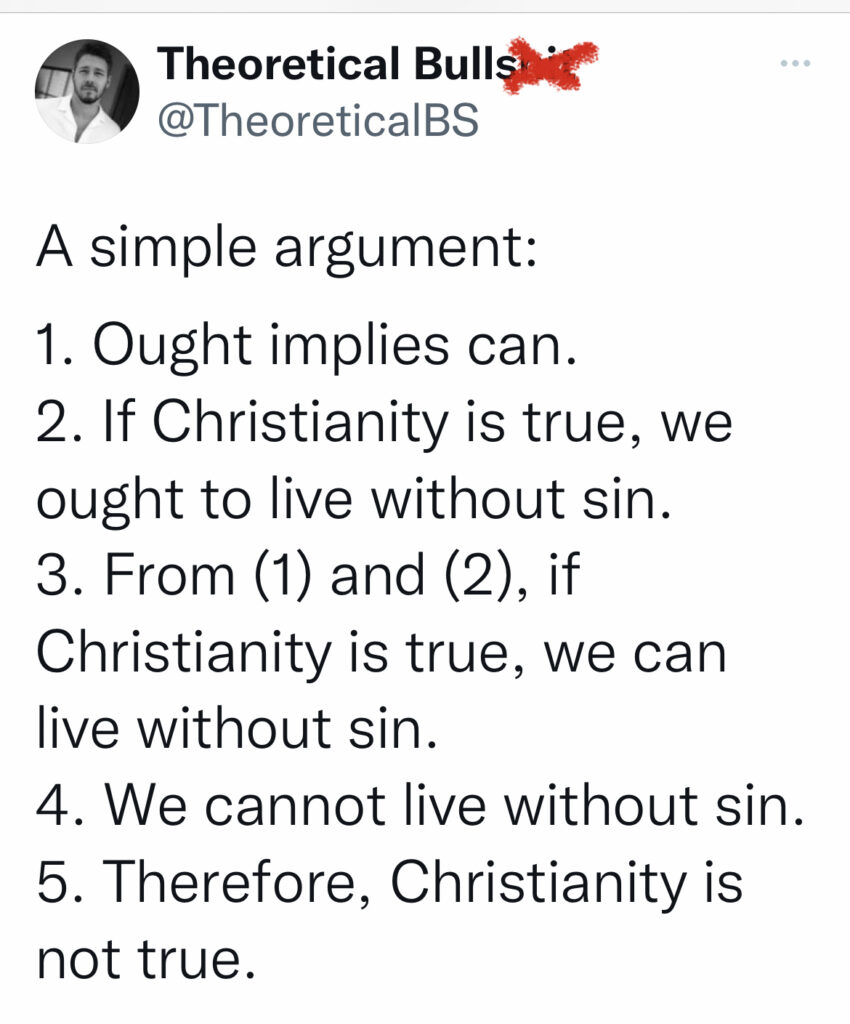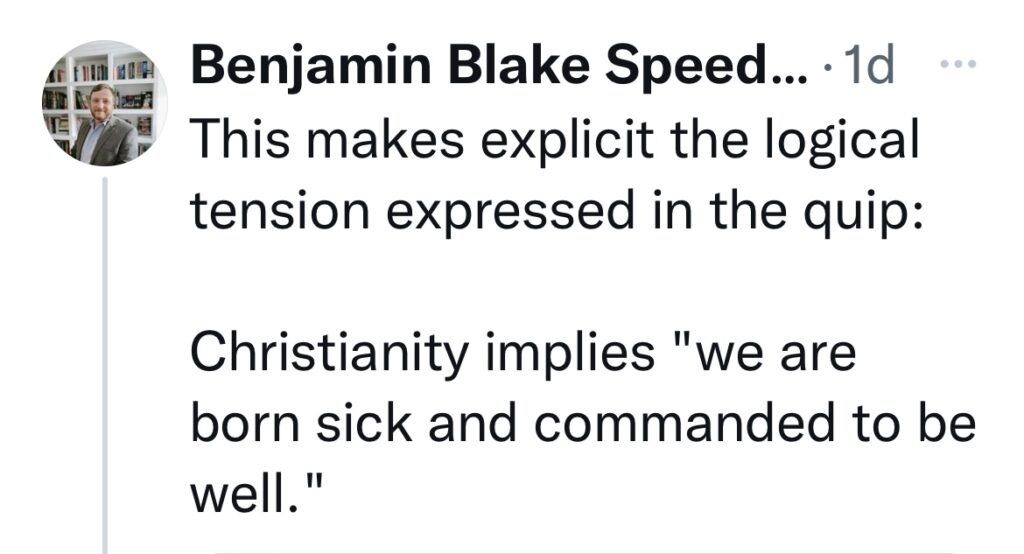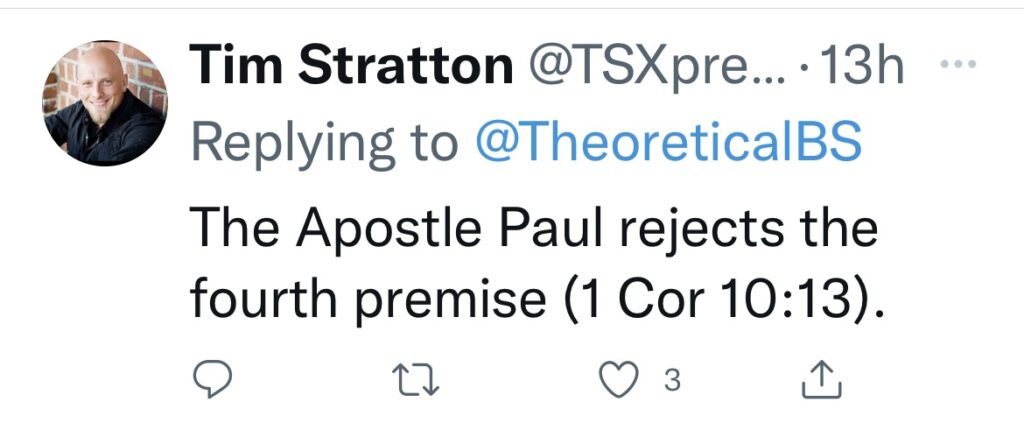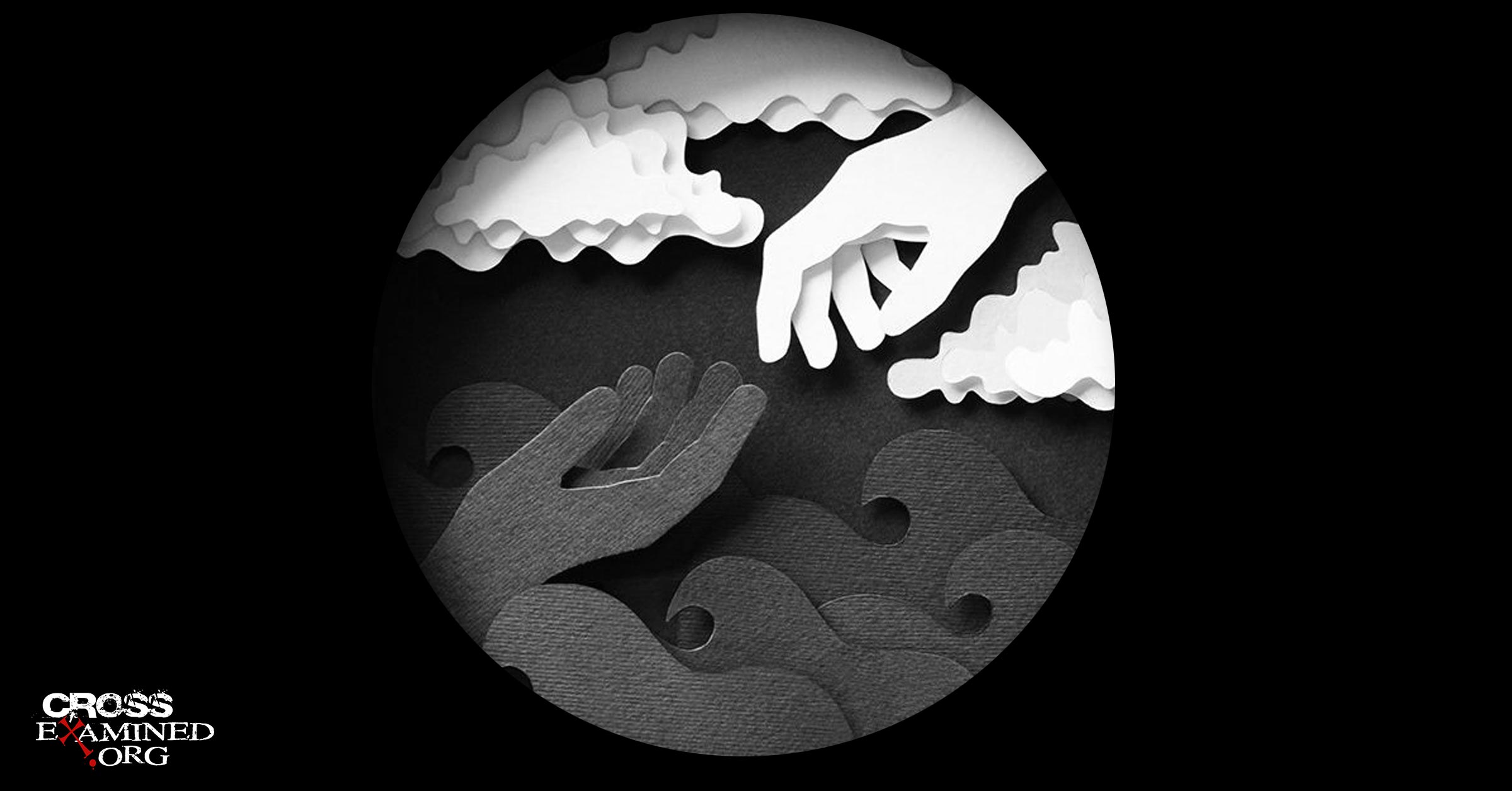By Tim Stratton
Sermon Outline
Riddle me this: What’s black and white and RED all over?
I remember the first time my dad posed that question to me when I was a young child. Even as a little boy – untrained in philosophy – I knew something was amiss.
I intuitively understood that if something was literally black and white . . . like a news paper . . . then it could not be the COLOR RED all over. After all, something cannot be the colors RED and Black and White simultaneously and in the same sense. There’s a contradiction here – nothing can actually be black and white AND the color red ALL OVER.
Then my dad explained to me that there was a “play on words” going on here – a “word game!” The “read all over” doesn’t refer to a color, but refers to the fact that someone can read the entire newspaper, and thus, the black and white newspaper will be READ all over.
Now, why can’t a newspaper actually be black and white AND the COLOR RED all over? Because this statement violates the logical law of non-contradiction.
The Laws of The Logos
How many of you know about the laws of logic?
I actually discuss the laws of logic in my book (my doctoral dissertation which was published last year). The first chapter is focused on how to properly interpret The Bible. Think about it: Interpreting Scripture correctly presupposes and depends upon the laws of logic. There are three fundamental Laws of Logic that are always required in rational discussion – and in interpreting Scripture:
- The Law of Identity: Something is what it is. Things that exist have specific properties that identify them.
Let’s talk about God. Christians typically recognize God as a Maximally Great Being who possesses certain properties such as omnipotence (perfect power), omniscience (perfect knowledge), and omnibenevolence (perfect love for all people). Some theologians claim that God does not love all people and thus, based on the Law of Identity, worship a different God. I have noted that this is dangerously close to idolatry (see this short video for more).
- The Law of Excluded Middle: A well-defined proposition is either true or false. There is no middle position. For example, the proposition that “A proposition is either true or false” is either true or false.
I’ve often said that the Law of the Excluded Middle is my favorite logical law! Think about it this way: God either exists or He doesn’t (there is no middle position). Jesus either physically rose from the dead, or He didn’t.
- The Law of Non-Contradiction: When two claims contradict one another, one must be false.For example, if one person claims that God exists and another asserts that God does not exist, we can know that one of us must be correct and the other must be wrong. When two propositions contradict one another, one must be false and the other must be true; they cannot both be true and they cannot both be false.Similarly, when two contrary statements are made (not to be confused with contradictory statements) we can know that at least one of them must be false (even though both of them could be false). If Bill says that “the moon is made entirely of green cheese” and Bob says “the moon is made entirely of blue cheese,” then these contrary statements cannot both be true. Either Bill or Bob must be wrong. In fact, both Bill and Bob are wrong.Now, let’s talk about contradictions: As Wayne Grudem puts it, “Contradictions aren’t acceptable in the study of systematic theology, since there aren’t any contradictions in the Bible.”
This presupposition is supported by Scripture itself. For example, Psalm 119:160 states that the sum of your words is truth and this implies, in turn, that God’s Word, which Christians believe is true in all that it teaches, will be logical when studied in the context as a whole.
Wayne Grudem continues:
“There are many times we need to acknowledge mystery, paradox, and things we can’t fully understand. But that’s different from saying there’s a [logical] contradiction. God never asks us to believe a contradiction.”
These laws are just as necessary to keep a person grounded in rationality as the law of gravity is necessary to keep them grounded on the earth. The laws of logic are tools which help a person to objectively determine true or false propositions, inferences, and deductions.
In my book I wrote the following:
“Logical laws apply to everyone regardless of when or where he lives, that is to say, the laws of logic transcend humanity and are objectively true. In fact, truth and logic are inextricably linked—one cannot have one without the other. Thus, if Christians claim that Christianity is true, then the affirmations of Christianity must be logical.”
Now, many people these days assert that “all religions are true!” Based on the laws of logic, however (namely, the law of non-contradiction), we KNOW this cannot be true! Consider statements made from different worldviews/religions:
Mohammad VS Jesus
Love those who consider you to be an enemy VS. Kill the infidel! (Which one is it?)
Hinduism VS Islam
“There are multiple gods” VS. “Allah is the one true God.” Both cannot be true
Buddhism VS Judaism
These religions contradict each other. They are mutually exclusive. They might both be false, but they cannot both be true. (BTW: They are both false).
Atheism VS Theism
Based on the logical law of the excluded middle, God either exists or He doesn’t. Since atheism says God does not exists and Christians, Jews, and Muslims claim that God does exist, one might not know what worldview is true, but one can KNOW – with certainty – that both views cannot be true simultaneously.
These views are mutually exclusive.
Every other view VS Mere Christianity
“God raised Jesus from the dead.” If those six words comprising that one statement is true, then some flavor of Christianity is true. CS Lewis described this as “Mere Christianity.” This leads us to what has been called “the most hated words in the Bible.” This verse is contained within today’s passage of Scripture.
READ: John 14:1-14
14 “Do not let your hearts be troubled. You believe in God[a]; believe also in me. 2 My Father’s house has many rooms; if that were not so, would I have told you that I am going there to prepare a place for you? 3 And if I go and prepare a place for you, I will come back and take you to be with me that you also may be where I am. 4 You know the way to the place where I am going.”
5 Thomas said to him, “Lord, we don’t know where you are going, so how can we know the way?”
6 Jesus answered, “I am the way and the truth and the life. No one comes to the Father except through me. 7 If you really know me, you will know[b] my Father as well. From now on, you do know him and have seen him.”
8 Philip said, “Lord, show us the Father and that will be enough for us.”
9 Jesus answered: “Don’t you know me, Philip, even after I have been among you such a long time? Anyone who has seen me has seen the Father. How can you say, ‘Show us the Father’? 10 Don’t you believe that I am in the Father, and that the Father is in me? The words I say to you I do not speak on my own authority. Rather, it is the Father, living in me, who is doing his work. 11 Believe me when I say that I am in the Father and the Father is in me; or at least believe on the evidence of the works themselves. 12 Very truly I tell you, whoever believes in me will do the works I have been doing, and they will do even greater things than these, because I am going to the Father. 13 And I will do whatever you ask in my name, so that the Father may be glorified in the Son. 14 You may ask me for anything in my name, and I will do it.
Let’s pray . . .
“I am the way, the truth, and the life. No one gets to the Father, but by me.”
In 1998 the great theologian and philosopher known as Madonna confidently declared (on MTV):
“All ways lead to God!”
Madonna, although I don’t remember her saying anything about Jesus at the time, was directly opposing Jesus. Well, based on the laws of logic, we must ask the question:
“Who is right!? Madonna or Jesus?”
If Madonna is right, then Jesus is wrong. But if Jesus is right, then Madonna is wrong.
In fact, just a couple weeks ago a survey was published showing that over 60% of self-described “born-again Christians in America between the ages of 18 and 39 do NOT believe that Jesus is the ONLY WAY to Heaven — and that Buddha and Muhammad also are valid paths to salvation, the Christian Post reported.
The Church (at large and across our nation) is in BIG TROUBLE!
Today, I’m going to give you reason to put your trust in the words of Jesus (as opposed to Madonna) and provide reasons as to WHY Jesus is THE ONLY WAY. In fact, all people should see that Jesus is the only way – the only way to eternal life in Heaven – for three reasons.
Reason #1: God raised Jesus from the dead!
God raised Jesus from the dead (thus, seemingly placing His divine stamp of approval on everything Jesus said, taught, and exemplified – and upon those Jesus chose to continue His teachings).
I don’t have time to unpack all of this right now, but based on the historical method – the same historical method that historians employ to find out facts about the past – the same historical method that historians have employed to find out facts about Abraham Lincoln, George Washington, Alexander the Great, Julius Caesar and so many more – is the same historical method historians have employed to find out certain facts about the historical person known as Jesus of Nazareth.
If you’d like to learn more please watch four videos I recorded about the historical resurrection on my YouTube channel:
Part 1- Historical Facts: https://cutt.ly/KYPicUq
Part 2- Examining the Evidence: https://cutt.ly/0YPibBB
Part 3- Hallucinations, Aliens, and Other Silly Ideas: https://cutt.ly/FYPiQ9e
Part 4- The Good News of the Resurrection: https://cutt.ly/mYPiRH5
Historians seek independent sources, such as, eyewitness accounts, both positive and embarrassing. These sources are plentiful when it comes to the life of Jesus and his resurrection. Mike Licona states that we have as much evidence of the resurrection, if not more, than we have of Julius Caesar’s crossing the Rubicon in 49 BC.
He notes that even the harshest skeptical and atheistic historians admit several things as historical fact about Jesus. For example:
- Jesus existed.
- Jesus died by crucifixion.
- Jesus’ disciples (at least) really believed that Jesus rose from the dead, and appeared to them.
- The church persecutor, and Christian hunter, Saul was radically transformed into the Jesus preaching Paul.
- The skeptic James (the brother of Jesus) was suddenly changed into someone who was willing to die for the gospel.
- The tomb of Jesus was found empty by his women followers.
Licona makes his case even stronger by utilizing a “minimal facts” approach that does not even reference the Gospels, meaning that even if the Gospels did not exist these facts about Jesus remain:
- Paul was an eyewitness (hostile).
- Paul knew Jesus’ disciples.
- Paul taught what the disciples taught.
- They taught appearances to individuals and groups, to friend and foe alike.
- They and Paul taught (and believed) Jesus was physically raised from the dead.
Points one through four are accepted facts regarding Jesus and the fifth, although not accepted by many skeptics, remains unrefuted. So, when it comes to the historical method we need to ask the following question:
What hypothesis best accounts for all of these facts?
In Licona’s book, he demonstrates that the resurrection hypothesis accounts for all of these facts – while no other scientific hypothesis offered accounts for all of these together. The best explanation of the facts is the hypothesis which makes sense of all of them together.
The resurrection hypothesis is the only one left on the table.
For a deep dive into this study, I recommend Licona’s book: “The Resurrection of Jesus.”
Bottom line: if God raised Jesus from the dead, then some flavor of Christianity has gotta be true. And if God raised Jesus from the dead, then it seems that God has given His divine stamp of approval to the words and life of Jesus . . . and we have no reason to think He has done so for Madonna.
Thus, a rational and logical person should follow Jesus on this matter and believe what He says in John 14:6 – Jesus is the ONLY WAY and NO ONE gets to the Father except through Jesus!
So, the first reason why you should believe that Jesus is the ONLY WAY, is because we have historical evidence that Jesus was raised from the dead (that’s great reason to celebrate Easter)! This seems to be a divine stamp of approval upon the life and teachings of Jesus, and since Jesus taught that He is the ONLY WAY, we have good reason to believe Him.
But this raises the philosophical question: WHY is Jesus the only way to God? This leads us to the next point:
Reason #2: Jesus is God!
Jesus is the only way to God because He is God.
Hold up! You might be thinking: Doesn’t saying that Jesus IS God violate the logical law of identity or the law of non-contradiction? Isn’t this some kind of a logical error?
A few months ago I led a youth group to Salt Lake City and BYU was kind enough to host our group, give us guided tour of their beautiful campus, they gave each one of us a nice BYU ball cap, and then we had a time of Q&A with one of the top Mormon leaders in Salt Lake.
One thing my Mormon friend said was that our view of Christianity had to be false because it is non-sensical to say that we worship ONE person and THREE persons at the same time.
I respectfully interrupted him and said,
“That’s not an accurate description of the Trinity, sir. We worship ONE WHAT and THREE WHOS. When one distinguishes between the WHAT and the WHOS one can see that there is no logical contradiction in saying that Jesus IS God . . . He is just not God the Father. Jesus is the Second Person of the Trinity, known as “The Son.”
So, the concept of “Jesus being God” is logically coherent . . . but do we have biblical reason to think Jesus actually is the Creator of the universe? Consider what both John and Paul say about Jesus. Since we are in the Gospel of John, let’s start there and rewind to the beginning . . .
John 1: states the following:
“In the beginning was the Word (Logos), and the Word was with God and the Word was God. He was in the beginning with God. All things were made through him, and without him was not anything made that was made…. And the Word became flesh and dwelt among us, and we have seen his glory, glory as of the only Son from the Father, full of grace and truth.”
Now, I just mentioned Easter, but this is the message of Christmas — God “dwelt among us” (Immanuel)!
What I want you to see here is that The Bible refers to Jesus as “The Logos” and implies that not only is Jesus God, but also gives us some insight into the Trinity. From a theological perspective, this passage of scripture carries much weight.
Science Supports Scripture
Do you know that we actually have scientific evidence supporting this scripture?
To quickly summarize: The current scientific consensus strongly supports the theory that all nature (the stuff that scientists can test and discover) had an absolute beginning (big bang cosmology, 2nd Law of Thermodynamics, and the Borde, Guth, Vilenkin Theorem of 2003).
Everything that begins to exist has a cause, and the evidence demonstrates that the universe (all nature) began to exist. It follows that since nature began to exist, nature cannot be the cause of nature itself. Therefore, the cause of nature must be something other than nature (supernatural).
This is exactly what the first chapter of John is stating about Jesus – he is the supernatural cause of the natural universe, and he entered into his creation so that we could know him. Think about that! The Creator of the universe entered into the universe to save the people within the universe. This is what Christmas is all about. This is why we have good reason to celebrate Christmas.
To survey some of the science supporting scripture (and more), click here!
“The Logic”
Another thing to keep in mind when reading the first Chapter of John is that the Greek word for “word” – “Logos” – is used synonymously with Jesus in the text. It is interesting to note that “logos,” in Greek, means, “the principle of reason.” This is where we get the word “logic.”
The Bible is clear that Jesus is God and seems to suggest that He is the grounding of logic and reason. You see, logic is grounded in the essence of God. Therefore, when we choose to think and behave logically, we are godly (approximating to or being like God).
On a side note: it’s quite interesting to note that Critical Race Theorists reject logic and exclaim that “appealing to logic and reason is racist!” However, God commanded us to “be reasonable” in Isaiah 1:18 . . . so, I’m gonna stay reasonable and appeal to logic no matter what anyone might call me.
See, “The Great Commission Is Racist!” https://cutt.ly/IYPiwoC
Bottom line: if you were thinking that we should not place so much emphasis on logic, then – according to John – you are not putting enough emphasis on the nature of Jesus!
Jesus is “The Logic” – the only way to make sense of reality!
With that said, what does the Apostle Paul say about Jesus in Colossians 1:16 . . .
The Preeminence of Christ
15 He is the image of the invisible God, the firstborn of all creation. 16 For by him all things were created, in heaven and on earth, visible and invisible, whether thrones or dominions or rulers or authorities—all things were created through him and for him. 17 And he is before all things, and in him all things hold together. 18 And he is the head of the body, the church. He is the beginning, the firstborn from the dead, that in everything he might be preeminent. 19 For in him all the fullness of God was pleased to dwell, 20 and through him to reconcile to himself all things, whether on earth or in heaven, making peace by the blood of his cross.
Wow! According to Paul, if one can say that the creation of the universe “flowed” (as it were) through one person of the Trinity, it would be through the Second Person of the Trinity – Jesus Christ Himself!
The Creator of the universe, entered into the universe, to save the people within the universe. How cool is that? With that in mind, let’s talk about HOW Jesus saved the people within the universe.
This is our last point about WHY Jesus is the ONLY WAY!
Reason #3: The atonement of Jesus just makes sense.
Why did Jesus have to die? Why is the wages of sin death? Why can’t the wages of sin be five bucks or seven years of hard labor?
Why did Jesus have to die?
Before addressing that all-important question, first understand two things: 1- who we are, and 2- who God is.
According to Westminster Confession, the objective purpose of mankind is to know and enjoy God. I like to “tweak” it ever so slightly, and state: The objective purpose of mankind is to grow in our knowledge of God, to grow in love with God, and to enjoy a personal relationship with our Creator for all eternity (Hosea 6:6; Luke 10:27; Col 1:9; 1 Tim 2:4).
Or to say it this way: You were created on purpose and for the specific purpose of enjoying a true love relationship with God into the eternal future.
Scores of humanity have considered the meaning and purpose of life. The fact remains, if God does not exist, then there is no objective purpose in life (Atheism Catch-22). Christians, however, do not suffer from this sort of conundrum. In fact, we have a ready answer. We know the objective meaning and purpose of life: God created every human to know, love, and enjoy God into the eternal future. This is why God created the universe and all of its contents. This is why you exist, so that you could know him. We were created on purpose and for that exact and specific purpose.
Like Oil & Water
By definition, God is a maximally great being and necessarily perfect in every way. Moreover, God created you to enjoy a perfect, holy, and pure love relationship with him.
But we’ve got a problem — a big problem! As a result of sin, now we as humans are anything but holy and pure. Now we are guilty, alienated, and corrupt in nature. Since we are corrupt and imperfect, we are unequally yoked with a maximally great being.
Like oil and water, now, we are “unmixable” with a perfect God. He is necessary perfection and we are infection. The two simply do not mix and that is a major problem for humanity.
So, humanity needs a savior. With a savior we can be justified instead of guilty, adopted instead of alienated, and have a purified and regenerated nature instead of a corrupt nature.
We were created for one objective purpose – to be the Bride of Christ (Eph 5:25-27) in a perfect and true love marriage. We were created to love and to be loved by our Creator. However, now, because of sin, we are infected and do not mix with necessary perfection any longer (i.e., oil and water). As a result, we are necessarily separated from God.
Our hearts were created to be “pointed” to God, but now they are dysfunctional, sick, and twisted because of this separation. Our hearts are now “curved in” on themselves, they are self-centered, selfish, and sinful. We have completely “missed the mark” (the objective purpose of human existence). This is literally what the word “sin” means in the original Greek. The “mark” is God, but we are separated from him; we do not even know God exists apart from his revelation. Due to this separation, we cannot even “aim” at God and of course we will “miss the mark” and sin.
We are infected, self-centered creatures – but we are not supposed to be. God created you for a specific purpose and gave you a job description: BE HOLY! (Namely by loving God and others.) Being holy means to be God focused instead of self-focused. The problem is, all of us have “missed the mark” and have become “infection.” Therefore, we have a damaged relationship with perfection – God.
Is Restoration Possible?
The question remains: how is a broken relationship restored? Two things must occur if a damaged relationship is to be restored: 1) The offended party must choose to bear the harm. 2) The offending party must choose to confess and repent. In our relationship with God, he is the offended party as we sinned against him. We are the offending party, and are thus powerless to restore this relationship on our own. Our works are meaningless unless God, as the offended party, chooses to bear the harm. Left to our own devices, our work does not work (Isaiah 64:6).
God is life! He is the author and giver of life. He invented it and life comes from him. In the well-known Bible verse, John 14:6, Jesus claims he is “the life.” If God is life, then separation from life is death. Since sin separates us from God (like oil and water), then, consequently, sin equals death. Therefore, in every aspect that you have life, you will die if you are separated from the source of life. “The wages of sin is death” (Romans 6:23).
If our relationship with God is to be restored, then God must bear the harm as the offended party. If the harm is death, then, God must die. One small problem though: it is logically impossible for a necessary being to die. God cannot die physically because he is immaterial and spirit. God cannot die spiritually because he cannot be separated from himself (although Jesus felt like it on the Cross).
You are a soul (an immaterial thinking thing) with one set of cognitive faculties. God is one soul with three sets of cognitive faculties. Just as your cognitive faculties cannot be separated from you as a spiritual substance (soul), God’s cognitive faculties (all three of them) cannot be separated from his “spiritual substance.”
If God is going to bear the harm, he has to die because the wages of sin is death. God cannot die as God. Therefore, if humans are to be saved, God had to become human so he could bear the harm and experience death. We need Christmas, we need Good Friday, and we need Easter to have a restored relationship with our Creator (Happy Holy-Days)!
Why do we need Easter (the Resurrection)? It took more than just executing Jesus, because if death was punishment, if Christ is still dead, then he is still being punished. The Resurrection is proof that God is satisfied with Jesus’ atoning work. Therefore, Christianity is true!
Remember, we were created on purpose and for the objective purpose to love God with our entire being. We see this demonstrated in multiple Bible verse such as Luke 10:27 and Matthew 22:37, we are to love God with all of our mind/soul, and body/strength.
The reason why you exist is to LOVE! You were created on purpose and for the specific purpose to love God . . . AND . . . to love our neighbors (and even those who consider you to be an enemy as our very selves!
Taken together—love God and love others—comprises the WAY of Jesus. We’re talking this morning about why we believe in the TRUTH of Jesus. But He also says that He is the WAY to live… and this is His way: “Love God and love everyone!”
The purpose of life is all about LOVE!
To do anything other than that is to miss the mark (the very definition of sin).
If we ever choose not to love God in any way that we have life, then our lives ought to be terminated because we are objectively broken. This is an appropriate outcome. If something breaks, we either throw it away, or we fix it. Now, as far as our broken relationship with God goes, we have the choice to either be “thrown away” or to be “fixed.” Because of the work of Jesus (the Atonement) all people can be “fixed” and restored — as we ought to be in an objective sense — if we choose to be.
Justice is Good
Consider the nature of God to gain understanding of these issues. Psalm 97 states, “Righteousness and justice are the foundation of his throne.” This is not referring to God’s chair; rather, this is stating the essential attributes and the essence of God. This describes who God is! In other words, if God did not exist, there would be no such thing as objective righteousness, goodness, wickedness, or justice. God is perfect love (1 John 4:8). Thus, perfect justice must be part of his essential omni-benevolent nature as well. After all, justice is good and loving.
When someone escapes justice, we intuitively know that it is a bad thing. God created the universe, and part of the fabric of His creation is a moral universe. There are also natural laws, mathematical laws, and logical laws that govern the universe. Similarly, there are moral laws that we are obligated to obey (Paul says they are “written on our hearts” in Romans 2:15).
Perfect justice demands punishment, or it is not really justice. God cannot turn a blind-eye to our sin and say, “Oh well, boys will be boys, girls will be girls, humans will be humans.” That is not justice; it is injustice and ignoring crime and ignoring evil is bad. Therefore, God cannot ignore our sin and remain worthy of worship.
If a criminal commits a crime, we know that he deserves to be punished. We also know that the punishment should be fair and that it ought to fit the crime. If a seventeen-year-old shoplifts a pack of bubblegum from the gas station, there should be an appropriate punishment – we don’t give him the death penalty! However, moral monsters like Ted Bundy, Timothy McVeigh, and Osama bin Laden deserve a much greater punishment than the bubblegum burglar.
Now think about our crimes; we might not be a Ted Bundy, or a Hitler; however, we have all committed crimes against the very essence of morality, love, goodness, and justice – God! Because of this fact, we do not “mix” or relate with God. One may object and state that they are generally a “good person.” This may be true; however, they are not perfectly good, and cannot “mix” with a necessarily perfect God. Our lives are broken and infected, and therefore, we need a savior so that we can have a relationship with our creator. This brings us to Jesus; this brings us to the cross.
Conclusion
Some have falsely accused God the Father of some form of “cosmic child abuse” because he took out his wrath on his innocent son, because we sinful humans made him so angry. This is bad theology (remember the doctrine of the Trinity). We worship one God (not three); Christians are monotheists. Jesus is God. It logically follows that Jesus *is* the offended party. Therefore, Jesus, at the cross, satisfied his own righteous wrath – his own justice (which is good), for us! This is amazing love! This is amazing grace (the Cross was enough)!
Do you see the beauty? The offended party (a sinless, holy, pure, and morally perfect God) became human to pay our gruesome debt, to bear the harm, to satisfy his morally perfect justice. Wow! Because God has chosen to bear the harm, now, we have a choice to make. We can either choose to accept God’s act of love on the cross, or we can reject God’s grace and deal with his justice (separation from God and all that is good). Do you want perfect justice or perfect love? Perfect love is Heaven and perfect justice is separation from the Creator of the universe (Hell).
Because of what Jesus has done, we can have a restored relationship with our Creator. All you have to do, as the offending party, is freely choose to confess, repent, follow, and fall in love with Jesus. This is the essence of the message of the Gospel.
You see, we have THREE very good reasons to believe that Jesus is the only way to Heaven, just as He claimed to be.
- God raised Jesus from the dead (a divine “stamp of approval”).
- Jesus is the only way to God because Jesus IS God.
- The atoning life, death, and resurrection just makes sense – no other religion or worldview offers anything similar.
Have you put your trust in Jesus? Do you love Jesus?
Pray . . .
Outro: What is black and while and SHOULD be READ all over? Your Bible!
Spend time in your Bible. That’s a great way to fall in love with Jesus.
Recommended resources related to the topic:
How Can Jesus be the Only Way? (mp4 Download) by Frank Turek
Can All Religions Be True? mp3 by Frank Turek
Counter Culture Christian: Is There Truth in Religion? (DVD) by Frank Turek
__________________________________________________________________________________________________________________________________________________
Timothy A. Stratton (PhD, North-West University) is a professor at Trinity College of the Bible and Theological Seminary. As a former youth pastor, he is now devoted to answering deep theological and philosophical questions he first encountered from inquisitive teens in his church youth group. Stratton is founder and president of FreeThinking Ministries, a web-based apologetics ministry. Stratton speaks on church and college campuses around the country and offers regular videos on FreeThinking Ministries’ YouTube channel.
Original Blog Source: https://bit.ly/3Gou2pR






